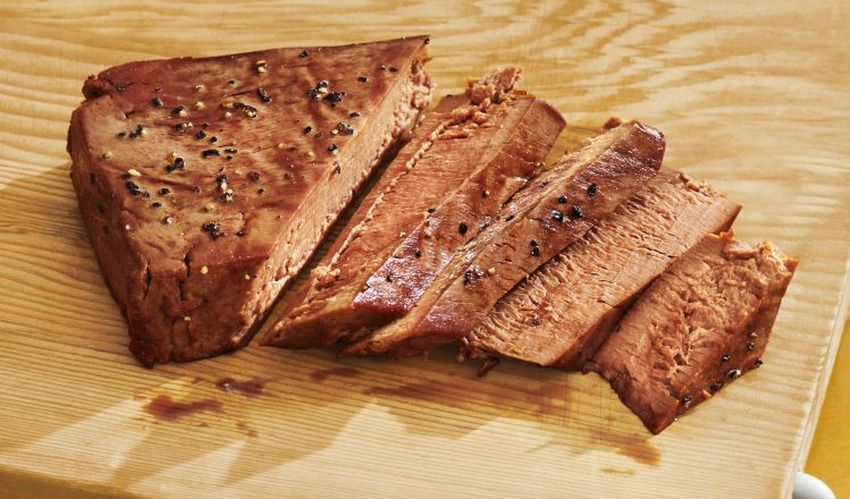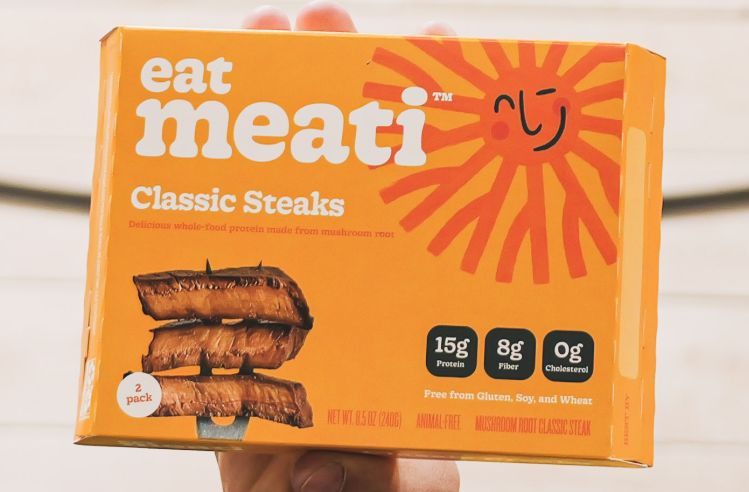As Meati rolls out nationwide at Sprouts stores in the US, president and COO Scott Tassani says he’s confident the minimally-processed ‘mushroom root’ steaks and cutlets can breathe fresh life into the flagging North American meat alternatives category, and reckons Meati can capture “20% of what we think will be a $5 billion retail market in five years.”
Meati is seeking to differentiate itself from others with a fungi-based platform capable of producing whole cuts of alternative meat from mycelium, filamentous fungi It recently started production at its “Mega Ranch” in Thornton Colorado, which will ultimately be able to produce 40 million pounds a year (the equivalent of about 151 million 120g steaks).
While Tassani’s bold predictions have raised some eyebrows given that the firm is barely out of the starting blocks, potential customers and investors believe Meati has the potential to disrupt the market, he insisted, noting that the Boulder, CO-based startup had raised an additional $20 million in funding since announcing a $150m Series C round last summer, bringing its cumulative funding to $250 million.
“I think we all need to work with retailers to do a better job on signage and communication [in the meat alternatives category], but I don’t believe the slowdown in growth is really due to inflation,” Tassani told AFN.
“The problem is that existing products have not delivered on taste, texture, and overall experience… or where they do deliver on these things, consumers don’t feel good about the ingredients. Meati products are 95% mushroom root and minimally processed, with no extracted proteins or binders.”
‘We have a pipeline of customers that want Meati, and it’s unlike anything I’ve ever seen in my many, many years at General Mills’
He added: “We have a pipeline of customers that want Meati, and it’s unlike anything I’ve ever seen in my many, many years at General Mills, and I’ve launched thousands of new products. We had very limited in-store activity to support the products during a trial at Sprouts stores in Colorado and we were getting very, very strong velocities.
“We get terrific feedback on taste and texture, but consumers are also really picking up on the quality of nutrition and the cleanliness of the ingredient deck.
“The first third of the Mega Ranch is fully operational at this point and we still have significantly more demand than we have product [to supply] in the near term. However, we will have a national omni-channel footprint by the end of 2023.”

Whole cuts… the Holy Grail of alt meat?
Unlike most meat alternatives, which use extruded soy, peas, or wheat protein, Meati Foods is seeking to stand out in a category dominated by processed products such as burgers and nuggets, by using a naturally occurring strain of mycelium to create ‘whole cut’ products grown in fermentation tanks in liquid suspension.
Inherently high in fiber and protein (60%+), Meati’s fungi are white with no particular flavor and have long fibrous filaments that mimic muscle structure. Each 120g classic steak has 15g complete protein with a protein digestibility (PDCAAS) score of 1.0, equivalent to animal protein, 8g fiber, 0g fat, and 40% of the RDA for vitamin B12. By comparison, a beef steak (depending on the type) typically has a little more protein, but no fiber, and some saturated fat.
While several other players use biomass fermentation to create meat alternatives, from Quorn, Nature’s Fynd and MyForest Foods to Enough Foods and The Better Meat Co (with whom Meati is currently embroiled in a legal dispute), Meati’s products have a unique texture, claimed Tassani.

Messaging: ‘Mushroom root’ makes the most sense to consumers
Although Meati’s strain of mycelium has no fruiting body (the part most consumers recognize as a mushroom), Meati is using the term “mushroom root” on the pack because it will be better understood, said Tassani.
As for safety, Meati’s mycelium products are self-GRAS (Generally Recognized as Safe) in the US, although the company has not yet submitted a dossier to the FDA, co-founder Justin Whiteley told AFN.
On health, said Whiteley, the potential benefits of mycelium are not yet well understood, hence the company’s recent decision to form a scientific advisory board featuring academics from UC Davis and the University of Tennessee: “As this research comes out the intention is to go through the peer review process, so information gets out to the general public.”
As for production efficiency, an ongoing challenge in the meat alternatives space, Meati’s submerged fermentation process can rapidly generate high volumes of product, while its vertically integrated process reduced costs, he said.
“We grow and pack the product on site, and as we go larger, we’ll achieve greater economies of scale. Right now on price we’re competing against organic, free-range meat, but as we scale we’ll be competing on price with the broader animal meat category.”






